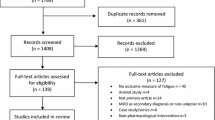Abstract
Fatigue is a psychophysiological state that acts on the subject’s motivation to engage in and/or to continue strenuous physical or cognitive activities. In various pathological conditions fatigue seems to lose this homeostatic function and presents itself as a symptom. The pathophysiology of fatigue is complex and includes neurological (central and peripheral) dysfunction, and altered neurotransmitter, cytokine, and hormonal settings. Treatment interventions are generally based on a sequential approach including treatment of comorbid factors, nonpharmacological treatments, and drugs.
Similar content being viewed by others
References
Malouff JM, Thorsteinsson EB, Rooke SE et al (2008) Efficacy of cognitive behavioural therapy for chronic fatigue syndrome: a meta-analysis. Clin Psychol Rev 28:736–745
Edmonds M, McGuire H, Price J (2004) Exercise therapy for chronic fatigue syndrome. Cochrane Database Syst Rev CD003200
Mustian K, Griggs JJ, Morrow GR et al (2007) Integrative nonpharmacologic behavioural interventions for the management of cancer related fatigue. Oncologist 12[Suppl 1]:52–67
Rietberg MB, Brooks D, Uitdehaag BM, Kwakkel G (2008) Exercise therapy for multiple sclerosis. Cochrane Database Syst Rev CD003980
NASA/MS Cooling Study Group (2003) A randomized controlled study of the acute and chronic effects of cooling therapy for MS. Neurology 60:1955–1960
Minton O, Stone P, Richardson A et al (2008) Drug therapy for the management of cancer related fatigue. Cochrane Database Syst Rev CD006704
Pucci E, Brañas P, D’Amico R et al (2007) Amantadine for fatigue in multiple sclerosis. Cochrane Database Syst Rev CD0002818
Romani A, Bergamaschi R, Candeloro E et al (2004) Fatigue in multiple sclerosis: multidimensional assessment and response to symptomatic treatment. Mult Scler 10:462–468
Stankoff B, Waubant E, Confavreux C et al (2005) Modafinil for fatigue in MS. Neurology 64:1139–11943
Wingerchuk DM, Benarroch EE, O’Brien PC et al (2005) A randomized controlled crossover trial of aspirin for fatigue in multiple sclerosis. Neurology 64:1267–1269
Author information
Authors and Affiliations
Corresponding author
Rights and permissions
About this article
Cite this article
Romani, A. The treatment of fatigue. Neurol Sci 29 (Suppl 2), 247–249 (2008). https://doi.org/10.1007/s10072-008-0952-z
Published:
Issue Date:
DOI: https://doi.org/10.1007/s10072-008-0952-z




